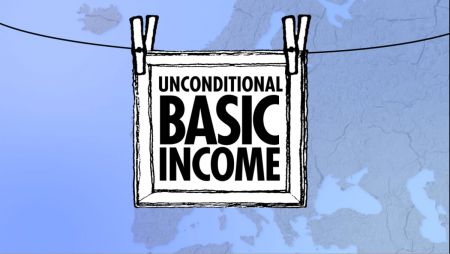KJIPUKTUK (Halifax) – A small but devoted group of people wants Nova Scotians to start thinking about the benefits of a universal basic income.
What would happen, the people associated with Basic Income Nova Scotia wonder, if anybody, whether working, looking for work, or without a job, were to be guaranteed an annual income well above the poverty line, no questions asked.
The group suggests $20,000 per year would be just about the right amount, allowing recipients the ability to participate as full citizens in society, with dignity and security.
Universality implies that it would be paid to everyone, rich and poor alike. However, because it would be funded through a progressive tax regime, technically the rich would fund their own and others’ basic income benefits, the group argues.
Karen Foster, an assistant professor in Dalhousie’s Department of Sociology and Social Anthropology, became intrigued with the notion while researching young people living in the streets and in shelters.
“It was disconcerting to see them cycle through social assistance, working in jobs without security, and getting fired or laid off, and reapplying for social assistance, having to prove that they deserve an income, all the while under that constant scrutiny of this vast bureaucracy,” Foster says.
“And to watch them go through all that in 2009, in a high unemployment period. These are people who are the last ones to ever get employment, homeless kids,” Foster adds.
A basic income would eliminate poverty, the group believes, while making our current welfare system with its patronizing and often mean-spirited bureaucracy mostly redundant.
“If we had a Basic Income that either increased if you had children, or that was directly given to the children, than just like that you would have the capacity to lift children out of poverty,” Foster says.
Women in abusive relationships would no longer be financially dependent on their abuser, as is now so often the case. People who live with disabilities would no longer be forced into desperate situations, Foster says.
A Basic Income also raises more fundamental questions about how we think about work, Foster says.
“We have to ask ourselves if the ideal of totally eliminating unemployment is feasible, and if it is good for the environment when we know that economic activity is the number one contributing factor to climate change, she says.
“Do we need to keep trying to grow the economy to get people to work, or can we use Basic Income to say we can provide for everyone without sacrificing their quality of life,” she asks.
Foster doesn't suggest that Basic Income would somehow spell the end of capitalism as we know it, as others have argued. But she does believe it will raise questions that change the dynamics to some extent.
“I see it as a way of weakening one of the most powerful mechanisms within capitalism, which is that if you need an income to survive you are utterly dependent on the labour market and on employers,” she says.
“$20,000 gives people the freedom to walk away and not necessarily have a lavish life, but to decide that it is enough to not partake in the market.”
It all sounds so good. What could possibly go wrong?
Lots, some people on the left argue, if the wrong people run with it. Libertarians and free market proponents are using the idea of a Basic Income to argue for the elimination of social programs and a legislated minimum wage.
“Most of the people involved with Basic Income are progressive, but there is always this risk that right wing thinkers imagine Basic Income as a way of doing away with all other state supports,” Foster says.
“There have to be minimum wage laws in place. What we have seen historically is that if you have a Basic Income without a minimum wage or without a competitive labour market then the whole thing falls apart,” says Foster.
Social programs such as publicly funded universal healthcare and Employment Insurance would not change, the group asserts. And a Basic Income would not take money away from people who because of the nature of their disabilities need additional funding.
The Nova Scotia group believes that Basic Income should be funded through progressive tax schemes, savings from poverty elimination, and tax reforms.
In the short term what members of Basic Income Nova Scotia want more than anything is to start a discussion it believes is long overdue.
The small group, a chapter of Basic Income Canada, hopes to organize a conference on the topic sometime in the spring.
By the time the next federal election comes around the hope is that Basic Income has become part of the discourse and parties will include their position in their platforms. At this time only the Greens have come out in favour.
Follow Basic Income Nova Scotia on Twiter and on Facebook.
Follow Robert Devet on Twitter @DevetRobert



